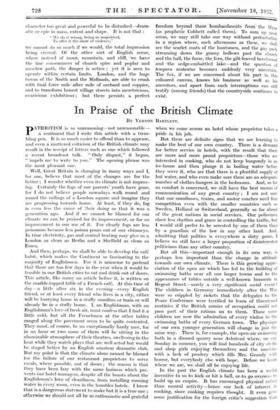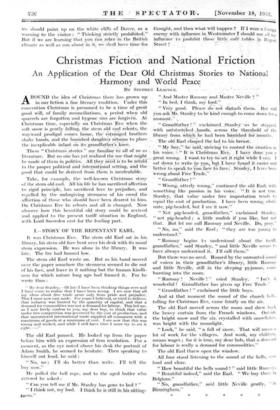In Praise of the British Climate
BY VERNON BARTLETT.
pATRIOTISM is so unreasoning—not unreasonable— a sentiment that I Write this article with a trem- bling pen. It is so much easier to offend than to appease, and even a muttered criticism of the British climate may result in the receipt of letters such as one which followed a recent broadcast talk. "Only disgust," it began, "impels me to write to you." The opening phrase was the most pleasant one.
Well, Great Britain is changing in many ways and I, for one, believe that most of the changes are for the better ; I wonder whether even its climate is not improv- ing. Certainly the fogs of our parents' youth have gone, for I do not believe people nowadays walk round and round the railings of a London square and imagine they are progressing towards home. At least, if they do, fog is even less the cause of their doing so that it was a generation ago. And if we cannot be blamed for our climate we can be praised for its improvement, or for an improvement in our use of it. For clearly fogs are less poisonous because less poison pours out of our chimneys. In time electricity, gas and central heating may give us a London as clean as Berlin and a Sheffield as clean as- Essen.
-- And then, perhaps, we shall be able to develop the café habit, which makes the Continent so fascinating to the majority of Englishmen. For it is nonsense to pretend that there are tot, few days in the year when it wOuld be feasible in our British cities.to eat and drink out of doors. This article, like many an article before it, is Written on the Marble-topped table -a a French café. At this time of day—a little after six in the evening—every English friend, or at least every friend who lives in a city, either will be hurrying home in a stuffy omnibus or train or will already he in a stuffy home. I, an Englishman, with an Englishman's love of fresh air, must confess that I find it a little cold, but all the Frenchmen at the other tables ranged along the pavement seem to be quite contented. They must, of course, be an exceptionally hardy race, for in an hour- or two some of them will be sitting in the' abominable atmosphere of their theatres, swelteringin the heat while they watch plays that arc well Acted but would be staged better by an English amateur dramatic club. But My point is that the climate alone cannot be blamed for the failure of our restaurant proprietors to serve meals, where possible, out of doors ; the reason is that they have been lazy with the same laziness which pre.: vents our hotel managers, despite all the boasts about the- Englishman's love of cleanliness, from installing running water in every room, even in the humbler hotels.. I know that is a dangerous statement to make but it is a true one, otherwise we should not all be so enthusiastic and grateful when we come across an hotel whose proprietor takes a pride in his job.
But there are definite signs that we are learning to make the best of our own country. There is a demand for better service in hotels, with the result that there are more and more proud proprietors—those who are interested in cooking, who do not keep burgundy in an ice-house and then plunge it in boiling water before they serve it, who see that there is a plentiful supply of hot water, and who even make sure there are an adequate number of clothes-hangers in the bedrooms. And, so far as comfort is concerned, we still have the best means of communication of any great country ; I am not sure that our omnibuses, trains, and motor coaches need fear competition even with the smaller countries such as Sweden, Holland or Switzerland, generally so far ahead of the great nations in social services. Our policemen show less rhythm and grace in controlling the traffic, but I would still prefer to be arrested by one of them than by a guardian of the law in any other land. And, admitting that politics is everywhere a dirty game, I believe we still have a larger proportion of disinterested .politicians than any other country.
But all 'this—important enough in its own way, is perhaps less important than the change in attitude towards our own climate. There is this growing appre- ciation of the open air which has led to the .building of . swimming baths near all our larger towns and to the appearance of tables outside a well-known brasserie in Regent- Street—surely a very significant social event! The children in Germany immediately after the War were so crippled by riokets that the delegates to the Peace Conference were terrified to learn of threatened mutinies if the British armies of occupation could not .pass part of their rations. on to them. Those same children are now the admiration of every visitor to the swimming baths of every_ German town. The physique of our own younger generation will change in just the same way. There is, for- example, -the open-air swimming bath in a disused quarry near Ashstead where, on any Sunday in summer, you will find hundreds of city clerks and shop girls enjoying themselves and the sunshine with a lack of prudery which fills Mrs. Grundy with horror, but everybody else with. hope. Before we know where. we are, we/ shall all be enjoying life. In the past the English climate has been a.. useful incentive fa us to kick, or hit h hall, or to go overseas to build up an enipire.. It has encouraged physical rather than mental activity—hence our lack of interest in cooking, since cooking requires thought. It even gave some justification for the foreign critic's suggestion that we should paint up on the white cliffs of Rover, as a warning to the visitor Thinking strictly prohibited." But if WC are learning; that you Ciin ielae in the British climate as well as run about in it, we 'shall have time for thought, and then what will happen ? If I were a foreign enemy with irgiuerice in .Westminster I should use all ins- influence to prohibit those little café' tables in Regent _ , . Street !

































































 Previous page
Previous page